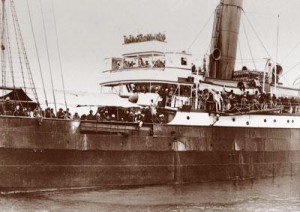NOII statement (English / Punjabi ): Commemorating 100 years of the Komagata Maru
Download flyer in English and Punjabi here
100 YEARS AGO the 376 passengers of Komagata Maru were refused entry into British Columbia by Canadian immigration officers. They experienced racism and hostility. Their inability to land caused hardship for the passengers, who soon lacked food and water, were denied access to medical attention, to communication with their family and to proper legal counsel.
As we commemorate this resilient journey and the determination of people, we honour their legacy including descendents who have persevered and established their lives here despite so many barriers. Now, 100 years later, the story of the Komogata Maru is being celebrated as an historical event that occurred at a time when “Our city looked very differentâ€.
For many however, these changes are not evident.
In August of 2010, 492 Tamil refugees made the three-month journey from Sri Lanka to British Columbia. Upon their arrival in Vancouver, the refugees, including 49 children and their mothers, were forced into three detention centres across the Lower Mainland amidst a national hysteria and racist discourse regarding “illegals” and “criminals.”
Ottawa has since made some sweeping and controversial changes to the immigration, asylum and refugee system, and the rules involving Canadian citizenship. These are changes that have been opposed by the Canadian Council for Refugees, Amnesty International, the Canadian Association of Refugee Lawyers, and the Canadian Civil Liberties Association as well as other groups. In the last four years the Canadian refugee system has become further restricted.
We recognize several repressive aspects of the current Canadian system:
Under the new Refugee Exclusion Act, a discriminatory two-tier asylum system is now in affect forcing shorter timelines for processing (15 days), denying the right to appeal, and restricting legal avenues for certain refugees based on nationality. Specific refugees now designated as “irregular arrivals†are subject to mandatory arrest and detention for up to a year. This Act granted the Immigration Minister arbitrary authority to designate certain countries as ‘safe,’ thus denying large numbers of refugees the right to a fair hearing based on their individual circumstances, as is required by the UN Refugee Convention to which Canada is a signatory.
What’s more, “irregular arrivals†are banned from applying for permanent resident status, sponsoring family members and acquiring refugee travel documents for five years even if their refugee claims are accepted.
Ottawa has also created a list of safe countries of origin — countries considered capable of providing state protection for their citizens. Refugees from “safe†countries will have their case fast-tracked through the refugee process, with their claims heard within 30 to 45 days. They will not be able to appeal the decision and will be deported from Canada in a year.
Family class immigration has dropped by 10,000 people or 15%. Kenney has also placed a moratorium on sponsorships of parents and grandparents. Instead, parents and grandparents have to apply for the temporary “Parent and Grandparent (of the Rich 1%) Super Visa†which requires a minimum income and private Canadian health-care insurance. Quotas for spouses and children have also been reduced by 4,000 per year.
In an era of austerity, mandatory detention for irregularly arriving migrants under this Omnibus anti-refugee Bill C-31 works in tandem with the Omnibus Crime Bill C-10. Together, they are part of the Conservative agenda to expand prisons and fill them with poor and racialized people.
“Temporary Foreign Workers†are being arrested, detained, jailed and deported for their desire to seek work – something that is impossible because of closed work permits which indenture workers to their employers. Once workers seek employment outside of the Temporary Foreign Worker Program, they are criminalized and discarded simply for their desire to improve their working conditions.
Migrant workers have documented experiences of isolation, discrimination, fear, exploitation, and limited access to social services. The typical migrant worker experience includes earning less than minimum wage, dangerous working conditions, and working 10-12 hours per day- often seven days a week- without overtime pay, basic employment standards, or the right to unionize. Most importantly, their temporary status makes them vulnerable to abuse and exploitation, as any assertion of their rights leads not only to contract termination but also deportation. Moratoriums have been imposed on new and pending permits of migrant workers in the fast food and restaurant sector. Unfilled positions tied to previous approval are being suspended.
Newcomers face discrimination in the housing market, with refugees, temporary residents, single parents, large families and people who do not speak English or French facing the greatest challenge in accessing safe, affordable housing.
Health benefits to refugee claimants have been cut and refugees being denied necessary health care, including emergency treatment for life-threatening ailments, sick children and pregnant women fleeing sexual violence
Hundreds of thousands of migrant workers will never be able to apply for residency of Canada because of our restrictive immigration laws.
We urge all at this time of reflection and celebration to remember yesterday’s injustices by standing against those happening today.
Â




